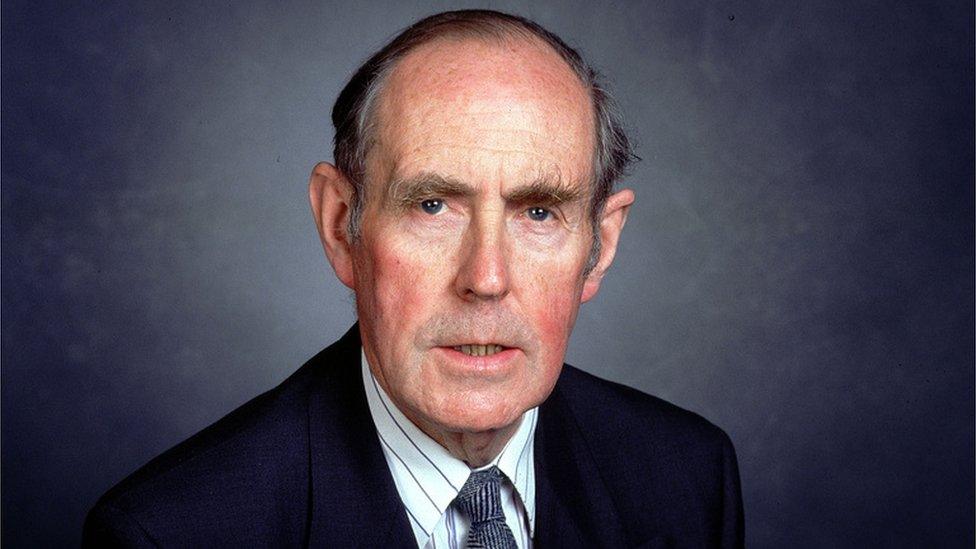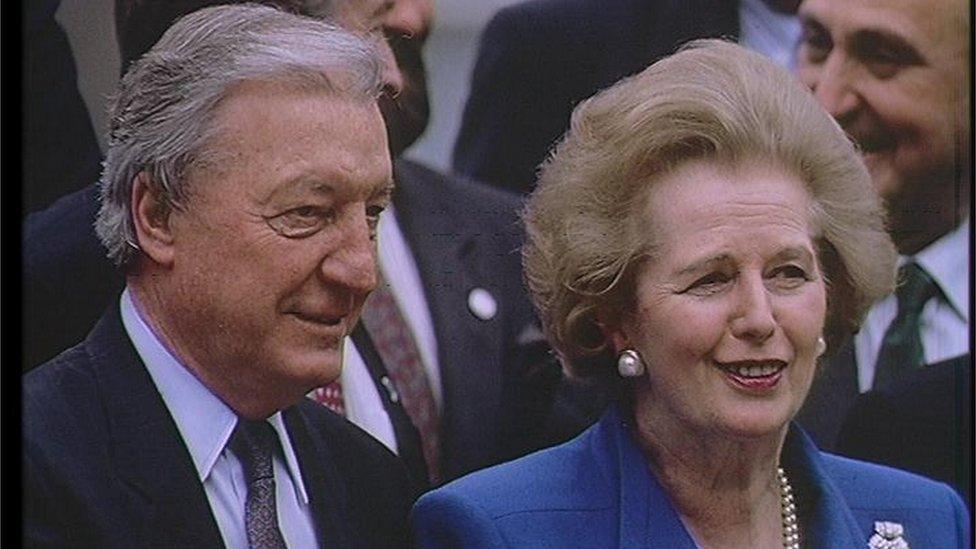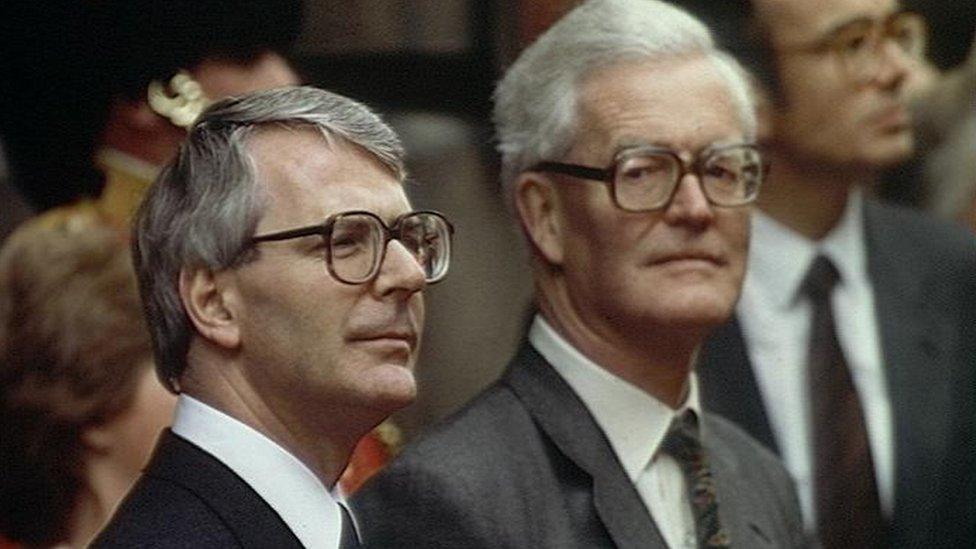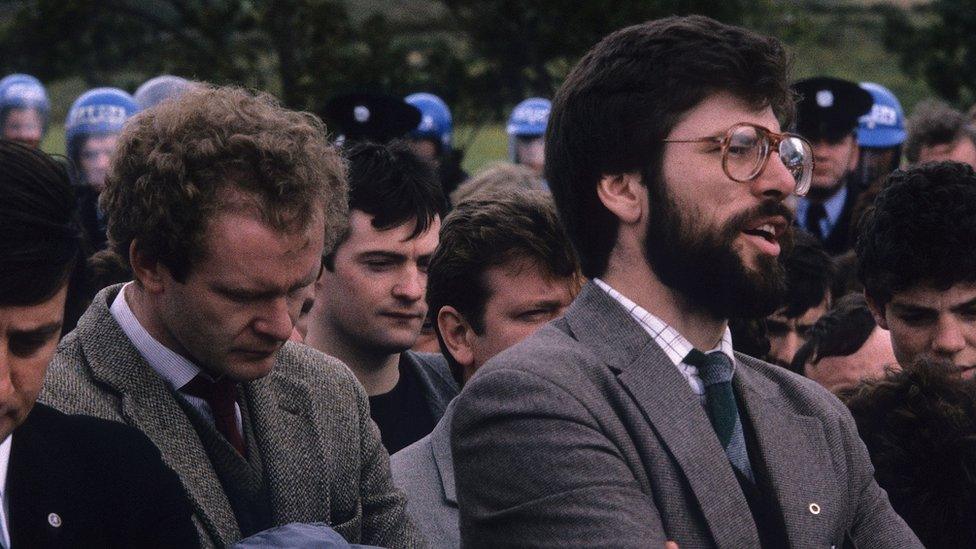Irish state papers: IRA 'wanted to exclude Sinn Féin from talks'
- Published

The IRA wanted to exclude Sinn Féin from proposed ceasefire talks with the British government, according to newly-released Irish state papers from 1990.
The Irish government document said the IRA's so-called army council told two prison chaplains that it was prepared to talk to the UK government.
But its least favourite approach was to involve Sinn Féin.
It said some Provisional IRA chiefs were averse to the "socialist views being espoused" by the party's leaders.
The message from a senior Irish official to colleagues in the Department of Foreign Affairs (DFA) has been made public after being kept in the Republic of Ireland's National Archives - under file reference number 2020/17/34. 260900 DEC 20 - for 30 years.
'Exploratory discussions'
Rev Will Murphy and Fr John Murphy, who were chaplains at the Maze Prison, had been engaged in a two-year process to encourage loyalist and republican prisoners to move away from violence.
On 4 May, 1990, Brendan McMahon, head of the Anglo-Irish Division, updated Dermot Gallagher, the assistant secretary at the DFA, on the potential breakthrough with the IRA.
"I had a conversation with Fr Murphy on 2 May who indicated that they had just concluded a series of intensive discussions with the IRA army council," he said.
"Arising from those discussions, the two chaplains had a meeting on 1 May with the four church leaders.
"At that meeting, the chaplains reported that the army council had clearly indicated to them their willingness to seek an alternative to the campaign of violence and, with this objective in mind, are prepared to enter exploratory discussions with the British government."

Northern Ireland Secretary Peter Brooke sanctioned backchannel talks between the UK government and the IRA a few months later
Mr McMahon added: "The army council's preference is naturally for such talks to be held in public, though they accept that any talks would probably have to be conducted in absolute secrecy.
"The IRA's third, and least favoured, option would be for talks involving Sinn Féin.
"Fr Murphy commented that one thing which has struck him in the course of this initiative is the noticeable difference between the IRA and Sinn Féin - with army council members referring to Sinn Féin as merely "the party which is the closest to our view".

Charles Haughey and Margaret Thatcher were two powerful personalities who didn't always see eye to eye
The 1990 Irish state papers also reveal that the accession of John Major as UK prime minister was regarded by the Irish government as an "important opportunity".
'Little knowledge'
Mr Major was seen as less likely to back the cause of unionism as strongly as his predecessor Margaret Thatcher, an internal Irish government communique reported.
A note, dated 12 December 1990, written by Dermot Gallagher to then-taoiseach (Irish prime minister) Charles Haughey said: "The indications are that, as of now, Major has no fixed views or indeed little knowledge about Northern Ireland.
"At the same time, by instinct and temperament, the new prime minister is likely to find the unionist posture essentially anachronistic.
"Unionist rhetoric - which at least at times struck a chord with Margaret Thatcher - will sit uneasily with his pragmatism.
"To the extent that the nationalist case can be couched in terms of logic and common sense, there may be a real possibility of enlisting Major's sympathy and support."

John Major succeeded Margaret Thatcher as prime minister in November 1990
On 30 July 1990, Former Eastbourne MP Ian Gow, who was Margaret Thatcher's parliamentary private secretary, died when the IRA detonated a bomb under his car.
The same note also speculates that the UK took the view that the Provisional IRA can "continue their campaign of violence indefinitely at the present, or even at an increased, level".
"This has horrendous implications for their security forces and also for the protection of public persons in Britain.
"The Leader of the House, John MacGregor, privately emphasised to the minister on Monday how shaken the Conservative Party had been - and still is - by Ian Gow's murder."
The note said that the chief constable in Northern Ireland had "emphasised the scale of the security problem" by saying that 5,000 British troops "could be swallowed up in any one area of the border".
"The British, I suspect, also realise that the Provisionals have the capacity, in the absence of draconian security measures, to bring down any new political structures in the north which exclude them," it added.
The newly published papers are contained in National Archives file reference number 2020/17/10. 260900 DEC 20.
- Published28 December 2019

- Published30 December 2018

- Published31 December 2019
![Sinn Fein President Gerry Adams (R) and his deputy, Mr Martin McGuinness look on as the hearses carrying the coffins of IRA members, Mairead Farrell, Daniel McCann and Sean Savage [IRA operatives killed in Gibraltar], set off from Dublin Airport heading for Belfast. Picture taken on 14/03/1988](https://ichef.bbci.co.uk/ace/standard/976/cpsprodpb/8823/production/_110315843_hi051244492.jpg)